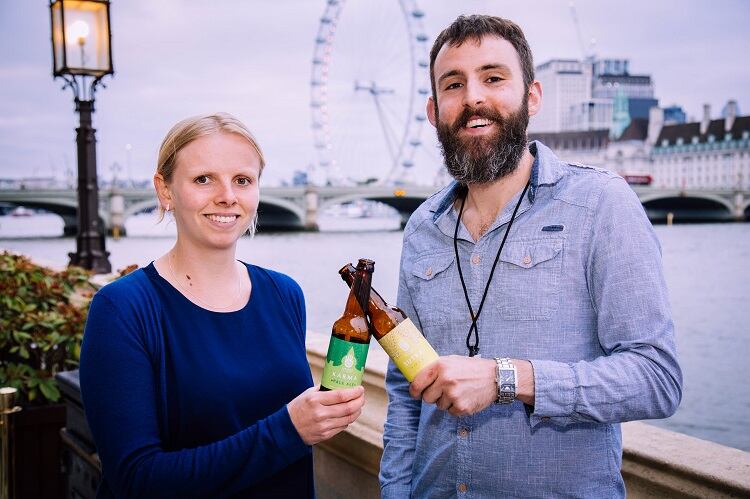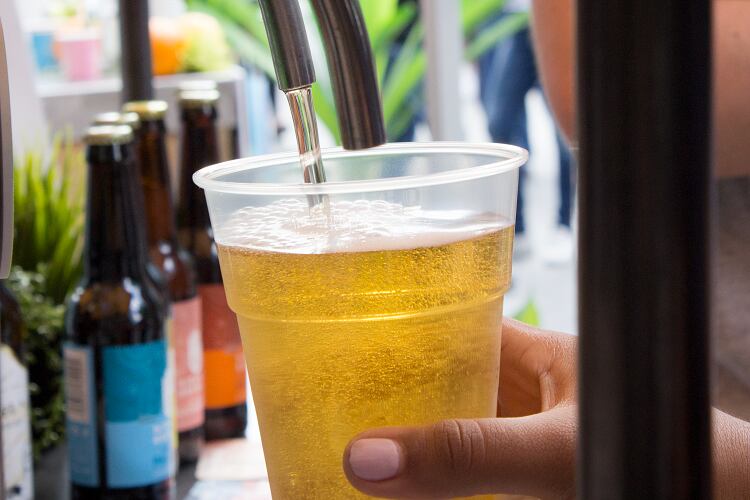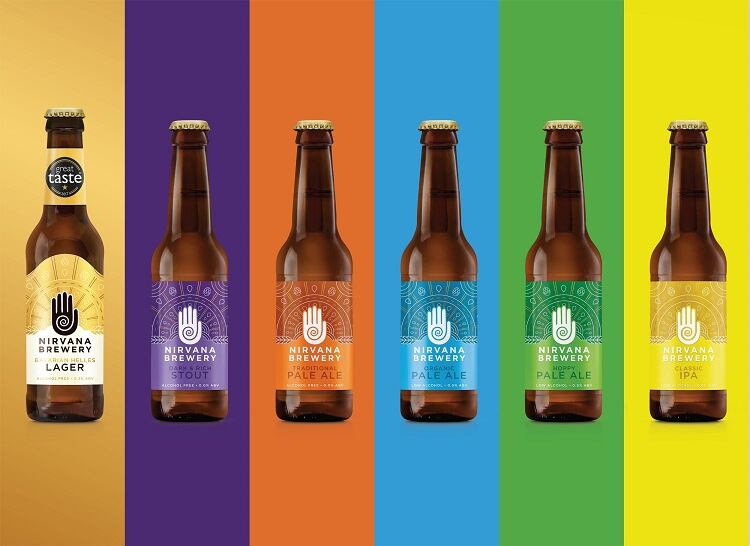Nirvana Brewery is the UK’s only non-alcoholic brewery. Launched in 2017 by a family of craft beer fans, the business has grown to sell a range of six no- and low-alcohol beers (under 0.5% abv) to restaurants, pubs, and retail stores.
While alcohol-free beverages have gradually increased in popularity in recent years, Nirvana Brewery’s co-founder and director Becky Kean told FoodNavigator the category ‘totally changed’ in 2019.
“In the beginning, we would be going into places to try to sell our beers and our concept. Managers would basically dismiss it, saying: ‘Nobody drinks alcohol-free beer, we’re not interested.’
“We were coming against this all the time,” she recalled during a recent visit to the brewery. “However, there were a few people who really ‘got it’, and that kept us going.”
Last year, Nirvana Brewery observed a ‘complete and utter reversal of attitudes’, whereby businesses were not only interested in stocking alcohol-free, but were open to selling multiple SKUs.
Today, bars and restaurants have several alcohol-free brands knocking on their door every week, Kean told this publication: “People are starting to pay attention.”
Competition: Friend or foe?
The alcohol-free trend is certainly brewing. According to Nielsen, alcohol-free beer is the fastest-growing drinks trend, and 2018 data from Kantar revealed that non-alcoholic beer sales were up 58% y-o-y.
While increased competition is not always welcome in the food and drinks world, Kean said it has undoubtedly helped to grow the category.
“It’s a double-edged sword, but ultimately, it has been helpful,” we were told. Yes, some of the bigger companies have the budgets for large-scale advertising campaigns – Diago-owned Guinness, Heineken, and AB InBev have all entered the category – yet Kean is convinced consumers still want a craft style. “So, in some ways, they are helping to grow the category for everyone.”
Nirvana Brewery is still the only non-alcoholic brand to have its own brewery in the UK, which also sets itself apart from the competition.
This is reflected in its consumer base, which is largely made up of 45-year-old-plus ‘craft beer lovers’, we were told. “We see a lot about Millennials being non-drinkers, but actually they’re not our biggest customers.”
Rather, a lot of Nirvana Brewery’s business comes from customers who ‘really enjoy a good beer’ but are trying to cut down on drinking. “They don’t want to compromise on taste, and they don’t want to miss out altogether,” Kean explained.
Non-alcoholic beer vs soft drink
In some respects, alcohol-free beer could be seen as competing with soft drinks, particularly in bars or environments where alcoholic beverages are served.
“I think in a lot of ways it is [competing with softs],” Kean told FoodNavigator, “because in the past, people may have chosen a lemonade [or soft drink] instead of alcohol. In that scenario, non-alcoholic beer is definitely taking away from that.”
However, the co-founder said that ultimately, the ‘whole category’ is growing. “So, I wouldn’t say that non-alcoholic beer is pinching sales from soft drinks, I would say that they are both growing. Most people will have a mixture of the two.”

One key reason consumers may opt for alcohol-free beer over soft drink comes down to their nutritional profiles: unlike non-alcoholic beer, conventional soft drinks are known for their high sugar content.
“A lot of the time, people are trying to cut out alcohol for health reasons,” Kean explained, “and a lot of alternatives to alcohol have loads of sugar. I’d say that alcohol-free beer is the healthiest thing you can drink – apart from water – in a pub.
“There is no refined sugar in it and is very low in calories – at around 40-50 calories per bottle. It is all natural, with no artificial sweeteners.”
A craft approach to alcohol-free
From both a taste and brewing perspective, Nirvana Brewery’s offerings tie-in closer to the craft beer category, rather than soft drinks or mainstream draft.
Kean and her brother Joe, together with entrepreneur Steve Dass, decided against a dealcoholizing technique when the trio launched the brewery three years ago.
When beer is dealcoholized, it is firstly brewed to full-strength, before being either filtered through a membrane, or heated to boil off the alcohol.
“Dealcoholizing can leave an artificial taste,” Kean explained. “It is obviously quite an unnatural thing for beer to be boiled after fermentation and it can ruin the delicate flavours of the hops.”
Instead, Nirvana Brewery – which today is run by Kean and her brother-in-law Andrew Keresey – brews beer to low gravity. By fermenting less malt, there is less sugar, and as a result, less alcohol. “We can be quite careful with the malt we use, and the temperatures we mash at. We also used a slightly different yeast, which doesn’t ferment the alcohol has strongly as conventional ale yeasts.”
Nirvana Brewery sells beer from 0% abv to 0.5% abv. The 0.5% abv SKUs indicate a small amount of fermentation, which Kean said helps to bring body and mouthfeel to the finished product.
“We wanted to go back to what makes a beer taste like a beer. For us, it’s all about the hops and the malts that are used. People are putting passion back into those ingredients.
“The category is becoming more like wine, where we talk about where the hops are from and the origins of those ingredients. This is what I think alcohol-free beer was missing. There wasn’t any of that ‘craft’. We’re bringing that same craft back to alcohol-free beer.” - Becky Kean, co-founder and director, Nirvana Brewery
From a price point of view, Nirvana Brewery is not too far off its craft competitors. A case of 12 Bavarian Helles Lager, for example, is priced at £22.50. “Our beer is typically cheaper than a full-strength craft beer of the same equivalent,” Kean explained.
Nirvana Brewery’s range will typically be more expensive than mass-produced, full-strength beer, however. This is due to the cost of fresh ingredients – “because it is harder to make alcohol-free beer than to make an alcoholic beer” – and the fact that Nirvana Brewery’s offerings are produced in small-batches.
Being alcohol-free, Nirvana Brewery is exempt from paying beer duty. Small brewers may be eligible for a Small Breweries’ Relief (SIBR), however, which means they pay a more proportional rate of duty on their beer.
“So if [a craft brewery is] competing with a big company like Heineken, then [they have] a bit of an edge to compete,” said Kean. “But when it comes to alcohol-free, we’re not paying the duty so we’re actually on a level pegging with a big company like Heineken, so that is a kind of barrier.”

Kean sees growth in the category and hopes to build capacity in the East London unit. The brewery is also investigating exporting opportunities, having observed growing demand from Northern Europe, Asia, and the US.
“We want [non-alcoholic beer] to sit on the shelf next to all the other craft beers. And in a lot of ways, we don’t want people to think of it as a totally different product – it is still a beer.
“Ideally, in the future, it will just be seen as another style of beer. It won’t be seen as this ‘whole other thing’. Not everyone is teetotal. Some drinkers also drink non-alcoholic on some days and a lot of people moderate.”
While still a nascent category, we asked Kean when she will know the category has ‘made it’. “When most bars have a line dedicated to alcohol-free,” she responded, “that is when it will really have become mainstream.”
For an inside view of the UK’s only non-alcoholic brewery and interview with co-founder Becky Keane, click here.



